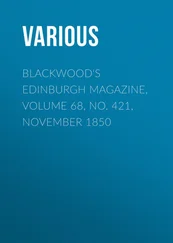Various - Blackwood's Edinburgh Magazine, Vol. 66, No 409, November 1849
Здесь есть возможность читать онлайн «Various - Blackwood's Edinburgh Magazine, Vol. 66, No 409, November 1849» — ознакомительный отрывок электронной книги совершенно бесплатно, а после прочтения отрывка купить полную версию. В некоторых случаях можно слушать аудио, скачать через торрент в формате fb2 и присутствует краткое содержание. Издательство: Иностранный паблик, Жанр: periodic, foreign_edu, Путешествия и география, на английском языке. Описание произведения, (предисловие) а так же отзывы посетителей доступны на портале библиотеки ЛибКат.
- Название:Blackwood's Edinburgh Magazine, Vol. 66, No 409, November 1849
- Автор:
- Издательство:Иностранный паблик
- Жанр:
- Год:неизвестен
- ISBN:нет данных
- Рейтинг книги:3 / 5. Голосов: 1
-
Избранное:Добавить в избранное
- Отзывы:
-
Ваша оценка:
- 60
- 1
- 2
- 3
- 4
- 5
Blackwood's Edinburgh Magazine, Vol. 66, No 409, November 1849: краткое содержание, описание и аннотация
Предлагаем к чтению аннотацию, описание, краткое содержание или предисловие (зависит от того, что написал сам автор книги «Blackwood's Edinburgh Magazine, Vol. 66, No 409, November 1849»). Если вы не нашли необходимую информацию о книге — напишите в комментариях, мы постараемся отыскать её.
Blackwood's Edinburgh Magazine, Vol. 66, No 409, November 1849 — читать онлайн ознакомительный отрывок
Ниже представлен текст книги, разбитый по страницам. Система сохранения места последней прочитанной страницы, позволяет с удобством читать онлайн бесплатно книгу «Blackwood's Edinburgh Magazine, Vol. 66, No 409, November 1849», без необходимости каждый раз заново искать на чём Вы остановились. Поставьте закладку, и сможете в любой момент перейти на страницу, на которой закончили чтение.
Интервал:
Закладка:
Accordingly, the ablest and best-informed statistical writers and travellers on the Continent, struck with the safe and expeditious method of getting quit of and reforming its convicts which Great Britain enjoys, from its numerous colonies in every part of the world, and the want of which is so severely felt in the Continental states, are unanimous in considering the possession of such colonies, and consequent power of unlimited transportation, as one of the very greatest social advantages which England enjoys. Hear what one of the most enlightened of those writers, M. Malte-Brun, says on the subject: —
"England has long been in the habit of disposing of its wicked citizens in a way at once philosophic and politic, by sending them out to cultivate distant colonies. It was thus that the shores of the Delaware and the Potomac were peopled in America. After the American war, they were at a loss where to send the convicts, and the Cape of Good Hope was first thought of; but, on the recommendation of the learned Sir Joseph Banks, New South Wales obtained the preference. The first vessel arrived at Botany Bay on the 20th January 1788, and brought out 760 convicts, and according to a census taken in 1821, exhibited the following results in thirty-three years, viz. —

In 1832, that population had risen to 40,000 souls. 8 8 It now (1849) exceeds 200,000 souls.
In 1821, there were in the colony 5000 horses, 120,000 horned cattle, and 350,000 sheep. It consumed, at that period, 8,500,000 francs' (£340,000) worth of English manufactures, being about £8, 10s. a-head, and exported to Europe about £100,000 worth in rude produce.
"Great division of opinion has existed in France, for a long course of years, on the possibility of diminishing the frequency of the punishment of death, as well as that of the galleys; but a serious difficulty has been alleged in the expense with which an establishment such as New South Wales would cost. It is worthy of remark, however, that from 1789 to the end of 1821, England had expended for the transport, maintenance, and other charges of 33,155 convicts, transported to New South Wales, £5,301,023, being scarce a third of what the prisoners would have cost in the prisons of Great Britain, without having the satisfaction of having changed into useful citizens those who were the shame and terror of society.
"When a vessel with convicts on board arrives in the colony, the men who are not married in it, are permitted to choose a wife among the female convicts. At the expiration of his term of punishment, every convict is at liberty to return to his own country, at his own expense. If he chooses to remain, he obtains a grant of land, and provisions for 18 months: if he is married the allotment is larger, and an adequate portion is allowed for each child. Numbers are provided with the means of emigration at the expense of government; they obtain 150 acres of land, seed-corn, and implements of husbandry. It is worthy of remark that, thanks to the vigilance of the authorities, the transported in that colony lose their depraved habits; that the women become well behaved and fruitful; and that the children do not inherit the vices of their parents. These results are sufficient to place the colony of New South Wales among the most noble philanthropic institutions in the world . After that, can any one ask the expense of the establishment?" – Malte-Brun, Géographie Universelle , xii. 194-196.
But here a fresh difficulty arises. Granting, it will be said, that transportation is so immense a benefit to the mother country, in affording a safe and certain vent for its criminals; and to the colonies, by providing them with so ample a supply of forced labour, what is to be done when they will not receive it? The colonies are all up in arms against transportation; not one can be persuaded, on any terms, to receive these convicts. When a ship with convicts arrives, they begin talking about separation and independence, and reminding us of Bunker's Hill and Saratoga. The Cape shows us with what feelings colonies which have not yet received them view the introduction of criminals; Van Diemen's Land, how well founded their apprehensions are of the consequences of such an invasion of civilised depravity. This difficulty, at first sight, appears not only serious but insurmountable. On a nearer examination, however, it will be found that, however formidable it may appear, it could easily be got over; and that it is entirely owing to the true principles of transportation having been forgotten, and one of the first duties of government neglected by our rulers for the last thirty years.
It is very remarkable, and throws an important light on this question, that this horror at the influx of convicts, which has now become so general in the colonies as to render it almost impossible to find a place where they can with safety be landed, is entirely of recent origin. It never was heard of till within the last fifteen or twenty years. Previous to that time, and even much later, transportation was not only regarded by the penal colonies without aversion, but with the utmost possible complacency. They looked to a series of heavy assizes in Great Britain with the same feelings of anxious solicitude, as the working classes do to a good harvest, or the London tradesman to a gay and money-spending season. Spirits never were so high in Sidney, speculation never so rife, property never so valuable, profits never so certain, as when the convict ships arrived well stored with compulsory emigrants. If any one doubts this, let him open the early numbers of the Colonial Magazine , and he will find them filled with resolutions of public meetings in New South Wales, recounting the immense advantages the colony had derived from the forced labour of convicts, and most earnestly deprecating any intermission in their introduction. As a specimen, we subjoin a series of resolutions, by the Governor and Council of New South Wales, on a petition agreed to, at a public meeting held in Sidney, on 18th February 1838.
4. Resolved. – That, in opinion of this council, the numerous free emigrants of character and capital, including many officers of the army and navy, and East India Company's service, who have settled in this colony, with their families, together with a rising generation of native-born subjects, constitute a body of colonists who, in the exercise of the social and moral relations of life, are not inferior to the inhabitants of any other dependency of the British crown, and are sufficient to impress a character of respectability upon the colony at large.
5. Resolved. – That, in the opinion of this council, the rapid and increasing advance of this colony, in the short space of fifty years from its first establishment, in rural, commercial, and financial prosperity, proves indisputably the activity, the enterprise, and industry of the colonists, and is wholly incompatible with the state of society represented to exist here.
6. Resolved. – That, in the opinion of this council, the strong desire manifested by the colonists generally, to obtain moral and religious instruction, and the liberal contributions, which have been made from private funds, towards this most essential object, abundantly testify that the advancement of virtue and religion amongst them is regarded with becoming solicitude.
7. Resolved. – That, in the opinion of this council, if transportation and assignment have hitherto failed to produce all the good effects anticipated by their projectors, such failure may be traced to circumstances, many of which are no longer in existence, whilst others are in rapid progress of amendment. Amongst the most prominent causes of failure may be adduced the absence, at the first establishment of the colony, of adequate religious and moral instruction, and the want of proper means of classification in the several gaols throughout the colony, as well as of a sufficient number of free emigrants, properly qualified to become the assignees of convicts, and to be intrusted with their management and control.
Читать дальшеИнтервал:
Закладка:
Похожие книги на «Blackwood's Edinburgh Magazine, Vol. 66, No 409, November 1849»
Представляем Вашему вниманию похожие книги на «Blackwood's Edinburgh Magazine, Vol. 66, No 409, November 1849» списком для выбора. Мы отобрали схожую по названию и смыслу литературу в надежде предоставить читателям больше вариантов отыскать новые, интересные, ещё непрочитанные произведения.
Обсуждение, отзывы о книге «Blackwood's Edinburgh Magazine, Vol. 66, No 409, November 1849» и просто собственные мнения читателей. Оставьте ваши комментарии, напишите, что Вы думаете о произведении, его смысле или главных героях. Укажите что конкретно понравилось, а что нет, и почему Вы так считаете.












